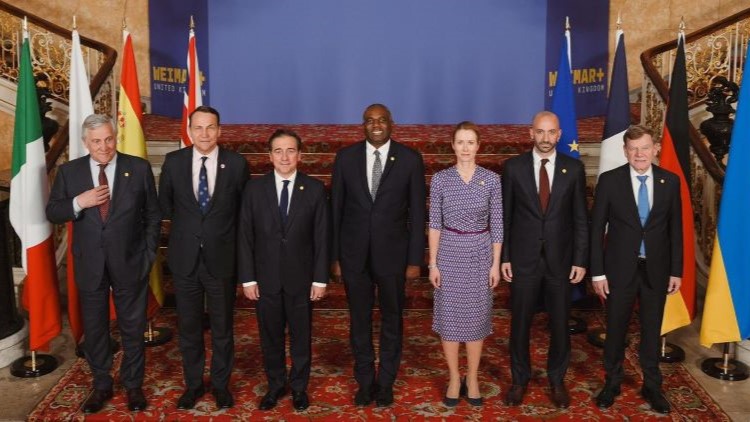Eduardo González
The Foreign Ministers of the Ukraine Support Group (G5+), meeting this Monday in London, called for an “immediate, full, and unconditional 30-day” ceasefire in Ukraine “to create a space for talks on a just, comprehensive, and lasting peace.”
In a Weimar+ Joint Declaration on Ukraine and Euro-Atlantic security, the G5+ ministers, or “Weimar Plus,” (specifically, the foreign ministers of Spain, José Manuel Albares; France, Jean-Noël Barrot; Italy, Antonio Tajani; Poland, Radoslaw Sikorski; the United Kingdom, David Lammy; and Germany, Johann Wadephul), and the EU High Representative for Foreign and Security Policy, Kaja Kallas, reiterated their “solidarity with the Ukrainian people” and “the victims of recent Russian attacks” and their “full support for the security, sovereignty, and territorial integrity of Ukraine within its internationally recognized borders.”
They also welcome “the peace efforts led by the United States” and the prospect of “new talks this week,” referring to Russian President Vladimir Putin’s proposal to Ukrainian President Volodymyr Zelensky to begin direct peace talks in Istanbul this Thursday.
However, they warn that “so far, Russia has not shown any serious intention to move forward” and, therefore, “must do so without delay.” “We join Ukraine in calling for an immediate, full, and unconditional 30-day ceasefire to create a space for talks on a just, comprehensive, and lasting peace,” they continue.
Along the same lines, Foreign Minister José Manuel Albares declared upon his arrival at the meeting that “peace negotiations without a prior ceasefire are not serious peace negotiations” and recalled that Zelensky has presented “a concrete, clear, and firm proposal for an unconditional 30-day ceasefire that should begin today.”
According to the signatories of the Joint Declaration, “any peace will only last if it is based on international law, including the United Nations Charter, and Ukraine is capable of deterring and defending itself against any future Russian attack.”
Ukraine’s defense
Furthermore, the ministers discussed how to further intensify “European efforts to support Ukraine in its ongoing defense against Russia’s war of aggression.”
“Ukraine must be confident in its ability to continue successfully resisting Russian aggression with our support,” they assert. “Strong Ukrainian armed forces will be vital,” and therefore, “we agree to work with Ukraine on initiatives to strengthen Ukraine’s armed forces, resupply ammunition and equipment, and further enhance industrial capacity,” the text continues.
“We are committed to strong security guarantees for Ukraine. This includes exploring the creation of a coalition of air, land, and maritime security forces that could help build confidence in any future peace and support the regeneration of Ukraine’s armed forces,” the Declaration reads.
“We will work on further reconstruction and recovery commitments, including at the Ukraine Recovery Conference in Rome on July 10-11, to ensure that Ukraine’s future security is underpinned by a dynamic economy,” it added.
The gathered ministers also pledged to “implement ambitious measures to reduce Russia’s ability to wage war by limiting the Kremlin’s revenues, discontinuing the shadow fleet, tightening the oil price cap, and reducing our remaining imports of Russian energy.” “We will keep Russian sovereign assets frozen in our jurisdictions until Russia ceases its aggression and pays for the damage caused,” they stated.
NATO and Defense spending
Furthermore, the G5+ reaffirms that “NATO is the foundation of our security and prosperity” and considers “a strong and united NATO, based on a strong transatlantic bond, an ironclad commitment to mutual defense, and fair burden-sharing, to be essential.”
“European countries must play an even greater role in ensuring our own security,” the text continues. “We will further strengthen NATO and the contribution of European Allies by increasing security and defense spending to meet the requirement for deterrence and defense in all domains of the Euro-Atlantic area,” the signatories add, also committing to strengthening collective defense capabilities and reinforcing Europe’s technological and industrial base.
